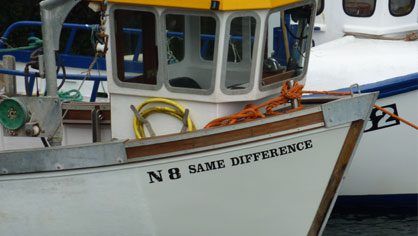25 May 2012
There is much to learn from the experiences of the UK and Scottish Marine Acts in taking account of the needs of fishing communities and the environmental consequences of changing marine use.
That was the message delivered by the NFFO and ANIFPO to the Environment Committee of the Northern Ireland Assembly on 17th May during its scrutiny of draft Marine Bill legislation.
The organisations are seeking a series of amendments to the draft legislation that would strengthen the Bill in the following ways:
Fisheries Displacement
Marine Protected Area (MPA) planning elsewhere in the UK has so far given insufficient attention to the problems of fisheries displacement. Not only is it of concern that the slightest variation in the available knowledge of seabed habitats should potentially overrule livelihood needs in the selection of sites, which has occurred in the selection of some MCZ proposals in English waters, but such selections upon prime areas of fishing ground risk setting in motion fisheries displacement that actually increases pressures upon the marine environment. Displacement considerations need to be upfront in the selection process and not an afterthought.
As a general rule, marine planning should give a presumption in favour to existing activities when considering how to accommodate new activities and there is a strong case for undertaking marine and MCZ planning in tandem.
Whilst such an approach should form a better basis to realise the synergies between marine use and marine protection, government must not abandon its moral obligation to those whose livelihoods would be affected; and to see that they are not disadvantaged when taking decisions that in the worst cases lead to the loss of lifelong careers or heavy costs to coastal communities.
Evidence
The general lack of evidence and uncertainty in understanding of natural processes in the marine environment, compared to terrestrial environment, mean that decision-making needs to be flexible and adaptive to the provision of new evidence when it becomes available.
Participation
Those affected by marine and MCZ planning should be centrally involved in the planning process, both because they stand to be affected by decisions, and because they often have local scale knowledge that is not otherwise available. There is also a need to strengthen the participation of other departmental bodies who are concerned with the sustainable development of the seas in MCZ planning.
Alan McCulla, Chief Executive of the Anglo-North Irish Fish Producers’ Organisation (ANIFPO) said: “We were able to provide a clear and concise message to the Environment Committee, which on the basis of feedback to date seems to have struck a chord. We are not opposed to MPAs, but as evidence has proven, the creation of such a network will only succeed where it has buy-in from fishermen. In the Irish Sea fishermen from Northern Ireland contribute 80% of the UK’s fishing effort in the area, which does not mean that 80% of the area is fished. Rather, given the knowledge possessed by our fishermen it would seem obvious that they should be to the forefront in helping identify areas for the MPA network.”
Assistant Chief Executive of the NFFO, Dale Rodmell, said: “The weaknesses of the UK Marine Act have been exposed in the MCZ planning process in England and Wales, something which the NFFO had warned against when that Bill was under scrutiny. Northern Ireland legislators need to avoid the pitfalls by strengthening the Northern Ireland Bill’s framework so that it is at the cutting edge in terms of its understanding of how to best allocate sustainable marine use whilst providing marine protection.”

